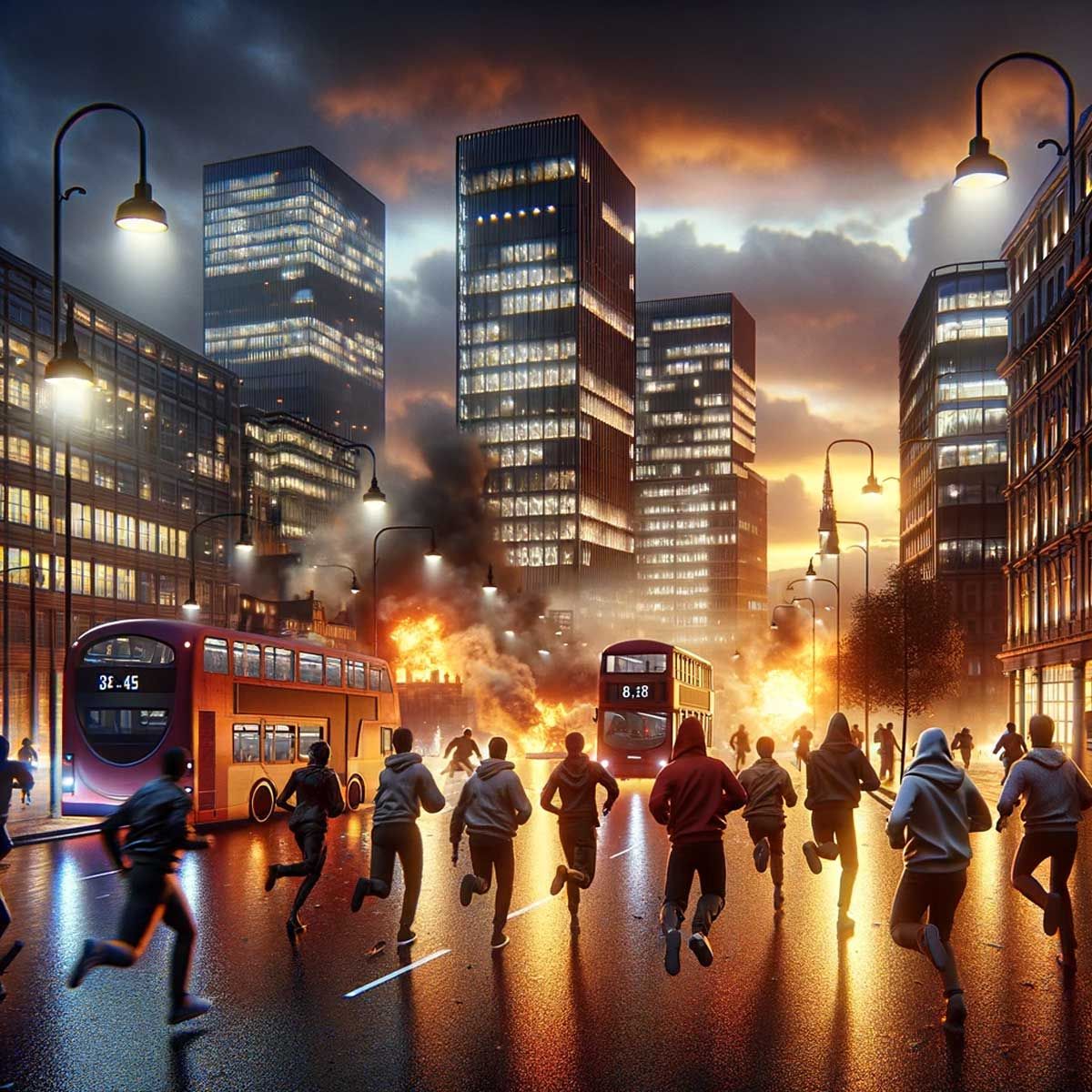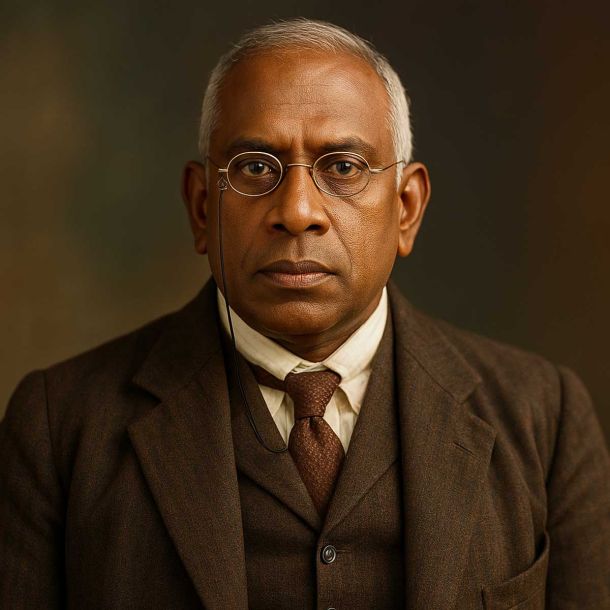MORE COVERAGE
Twitter Coverage
Satyaagrah
Written on
Satyaagrah
Written on
Satyaagrah
Written on
Satyaagrah
Written on
Satyaagrah
Written on
JOIN SATYAAGRAH SOCIAL MEDIA
"Enough is Enough": Dublin is burning as citizens' anger explodes into violent protests & arson after an Algerian migrant's stabbing of 3 children and 2 adults; the community, shocked and grieving, fiercely confronts issues of immigration and safety

Dublin, the capital of Ireland, witnessed a surge of violent protests on Thursday evening, November 23, following a harrowing knife attack that left five people, including three children, wounded. The assailant, an individual of Algerian descent now an Irish national, triggered a wave of anger and turmoil that culminated in the burning of an immigration office by incensed citizens.
|
In the bustling heart of Dublin city center on the afternoon of November 23, this shocking incident unfolded, leaving a trail of pain and fear. Among the injured were three young children and two adults, all of whom were caught in the unexpected and tragic attack on Parnell Square. The severity of the situation was heightened as two of the victims, a girl and a woman, suffered grievous injuries.
This act of violence, as reported by Gript Media, is believed to have been perpetrated by an individual originating from Algeria, a country in North Africa. The Irish Times further detailed that the chief suspect is thought to be "a naturalised Irish citizen, who has lived here for 20 years." This revelation about the suspect's long-term residence in Ireland adds a complex layer to the incident, intertwining issues of immigration, national identity, and community safety.
The reaction to this incident was swift and fierce. Anguished and outraged, Dublin's citizens responded by targeting the symbol of immigration—the local immigration office. The burning of this office serves as a stark indicator of the community's deep-seated emotions and the escalating tensions surrounding immigration and national security.
This event not only marks a tragic day for the victims and their families but also signifies a turning point in the public discourse on immigration and integration in Ireland. The violent protest and the destruction of the immigration office reflect a community grappling with shock, fear, and a quest for answers in the wake of such an unforeseen and devastating attack.
In a shocking turn of events in Dublin, Ireland, a man in his 50s has been detained by the police following a stabbing spree that left several people, including young children, severely injured. The gravest of these injuries was inflicted upon a 5-year-old girl, who is currently undergoing emergency treatment in the hospital. The assailant's actions have not only caused physical harm but have also left a deep psychological scar on the community.
The incident, which occurred in Parnell Square, a bustling hub in Dublin's city center, has raised numerous questions and concerns, especially regarding the nationality of the suspect, a detail the police have yet to disclose. This lack of information adds a layer of uncertainty and apprehension to the already tense atmosphere in the city.
|
In addition to the critically injured 5-year-old girl, the attack affected others as well. A 6-year-old girl sustained less severe injuries but remains hospitalized, and a 5-year-old boy, fortunately, has been discharged. Furthermore, a woman in her 30s and a man in his 50s are also receiving medical attention for serious injuries inflicted during the assault.
In an effort to clarify the nature of this tragic event, the Irish police have stated that they are not considering terrorism as a motive for this "serious assault." This stance aligns with another report from PBS, affirming that the incident is not being treated as a terror-related event.
Despite the chaos and fear that gripped the city in the aftermath of the attack and the ensuing protests, the streets of Dublin were reported to be "mainly calm" shortly before midnight, as per the Irish public broadcaster RTE. The return to calmness, however, comes in the wake of a major operation undertaken by the authorities to restore order and address the public's safety concerns.
This series of events paints a complex picture of a city rocked by violence and its aftermath. It highlights not only the immediate impact on the victims and their families but also the broader implications for public safety, community relations, and the ongoing discourse on national security and societal cohesion in Ireland. The incident at Parnell Square serves as a poignant reminder of the fragile balance between safety and social harmony in urban centers.
In the aftermath of the harrowing stabbing incident in Dublin, the Gardai, as the Irish police are commonly known, have been at the forefront of managing the situation and providing updates to the public. They issued a statement to CNN, saying, “Further information and details of specific incidents we be provided at the conclusion of this operation.” This commitment to transparency and communication is a crucial part of their strategy to maintain public trust and order during such a critical time.
|
Adding to the efforts of reassurance, Gardai Superintendent Liam Geraghty addressed the media in Dublin, emphasizing that there is “no terror-related activity” involved in the stabbings. His confirmation serves to dispel some of the fears and speculations that might have arisen in the community. Superintendent Geraghty's acknowledgment of the public's role in intervening to stop the attacker highlights the bravery and quick action of ordinary citizens in the face of danger.
Superintendent Geraghty also provided insight into the ongoing investigation, stating, “It would appear to be a standalone attack and we need to determine the reasons behind it.” This comment suggests that the incident, while severe, is not part of a larger pattern or threat, focusing the investigation on understanding the specific motivations of the assailant. His mention of keeping an “open mind” during the early stages of the investigation underscores the complexity and sensitivity of the case, ensuring that all possible angles are explored before reaching any conclusions.
In a display of their continued involvement and concern, the police have been in contact with the families of the children involved, as confirmed by the Gardai. This outreach is an important aspect of the police's response, offering support and information to those most directly affected by the tragedy. While the Gardai have stated they aren’t looking for any additional suspects, the lack of further details about the nature of the incident maintains a level of uncertainty and anticipation for more information as the investigation progresses.
|
The knife attack in Dublin has drawn attention and concern at the highest levels, with European Union Commission President Ursula von der Leyen expressing her reaction to the event. According to a statement on X, she conveyed that she was “shocked” by the knife attack. This sentiment echoes across political spheres, highlighting the gravity of the incident and its resonance beyond Ireland's borders.
Ireland’s own deputy prime minister also shared his distress, stating he was “deeply shocked by the serious incident in Dublin.” Such statements from top government officials underscore the severity of the situation and the impact it has had on the national psyche.
Adding to the complexity of the incident, a spokesperson for the Irish police relayed to CNN that statements made by the commissioner and quoted by the RTE indicated that terrorism could not be definitively ruled out as a motive behind the attack. This revelation, while not conclusive, adds a layer of complexity to the investigation and heightens public concern about the nature of the violence.
The repercussions of the attack and subsequent protests have been far-reaching, affecting the daily life in Dublin. RTE reports that the violent clashes significantly disrupted public transportation, with buses being diverted from their routes around Parnell Square and the closure of one of the city's main train stations.
|
The impact of the unrest was also felt by the city’s public bus operator, which suspended all city bus services on Thursday evening, further indicating the level of disruption caused by the events. Additionally, Trinity College, a renowned university, took the precaution of closing all gates to its campus, as reported by RTE, reflecting the widespread concern for safety following the attack.
Sinn Fein Leader Mary Lou McDonald also commented on the situation, stating on X shortly after the incident that the violent attack “has sent shock and horror throughout the community.” Her statement captures the deep emotional response from the community, reflecting a sense of disbelief and fear that has permeated the city in the wake of the violence.
The aftermath of the knife attack in Dublin has not only shaken the community but also led to intense and violent protests, as captured in video footage published by Reuters. This footage shows a bus set ablaze and protesters clashing with riot police, with some individuals seen kicking at police shields. These visuals are a stark manifestation of the heightened emotions and tensions that have enveloped the city.
Ireland’s Justice Minister, Helen McEntee, took a firm stance in her characterization of the protesters. She labeled them as “thugs” and “criminals,” accusing them of exploiting the horrific attack to “sow division and wreak havoc in the city.” Her strong words reflect the government's condemnation of the violence and its commitment to maintaining public order.
|
McEntee emphasized the proactive response of the Gardai (police), stating, “Every force possible is being used by the Gardai to restore order to this city.” This declaration underscores the seriousness with which the authorities are addressing the unrest, deploying significant resources to manage the situation.
Further intensifying the situation, social media videos from earlier Thursday depicted a group of men violently clashing with officers in Dublin, including setting a police car on fire. One of the videos showed a man holding a sign that read, “Irish Lives Matter,” while some protesters were heard chanting anti-immigrant slogans, including: “Get them out.” These incidents highlight the complex and charged nature of the public's reaction, with underlying socio-political tensions coming to the fore.
Drew Harris, the commissioner of the Gardai, expressed his strong condemnation of the clashes, describing them as “disgraceful scenes.” He attributed the violence to a “complete lunatic hooligan faction, driven by far-right ideology.” Harris’s directive for officers to make arrests in response to the violence is indicative of the Gardai's determination to quell the unrest and hold those responsible accountable.
In the wake of the chaotic and violent events in Dublin, the chief of the Gardai made a crucial appeal to the public, urging responsibility and caution in the face of rampant misinformation. “We ask people to act responsibly, not to listen to misinformation and rumor that is circulating on social media,” he stated. This plea highlights the role of social media in shaping public perception and the potential for misinformation to exacerbate an already tense situation. He further elaborated on the challenge of distinguishing facts from fiction in such a volatile environment, noting that “the facts are being established but the facts are still not clear, and a lot of the rumor and innuendo is being spread for malevolent purposes.” This acknowledgment reflects the complexities involved in managing the aftermath of such an incident, where accurate information is critical but often obscured by rumors and speculation.
|
The physical toll of the attack is heartbreakingly evident in the medical emergencies it precipitated. A 5-year-old girl, severely injured in the incident, is receiving emergency treatment at Temple Street Hospital, highlighting the tragic impact on innocent lives. Additionally, a boy of 5 and another girl aged 6 were brought to the CHI Crumlin hospital for treatment, with the boy fortunately being discharged.
Further details emerged about the victims, including a woman in her thirties who is being treated at the Mater hospital. She was reportedly an employee of the school where the incident occurred, underscoring the far-reaching implications of the attack on the local community.
The scale of the emergency response was significant, with five ambulances and four Dublin Fire Brigade vehicles called to the scene, a testament to the gravity of the situation. Additionally, a number of emergency vehicles were stationed outside the Gaelscoil Cholaiste Mhuire primary school, indicating the extent of the law enforcement and emergency services' involvement in responding to the crisis.
In a display of public intervention, the attacker in Dublin's recent stabbing incident was reportedly stopped by passers-by, who bravely took action to subdue him and disarm him by snatching the knife and throwing it away. This courageous act by ordinary citizens played a crucial role in preventing further harm. Following this intervention, the police confirmed that the accused is now detained and that they are not actively seeking any additional suspects in relation to this attack.
|
|
The incident, however, sparked a significant and aggressive response from the public. Anti-immigrant protesters flooded the streets of Dublin, reportedly mobilized by calls to action on social media. This response highlights the power of social media in rallying public sentiment, especially in situations charged with emotional and political implications.
The protests had a substantial impact on daily life in Dublin, severely disrupting public transportation. The chaos escalated to the extent that vehicles, including buses, were set on fire, reflecting the intensity of the protesters' emotions and actions.
In response to the escalating situation, the National Bus and Rail Union took decisive action, instructing all buses in Dublin to cease services "with immediate effect." This move, along with the suspension of all Luas and Dublin bus services, indicates the severity of the disruption and the concern for public safety. Reports also emerged of groups of people heckling the Gardai (Irish police), adding to the tense atmosphere in the city.
|
The Irish Times reported additional disturbing developments, including the looting of shops, signifying a further breakdown of order amidst the chaos. This spree of looting amidst the protests underscores the complexity and severity of the situation, as public outrage spills over into different forms of civil unrest.
In the midst of this turmoil, Garda Commissioner Drew Harris pointed to a specific cause for the riots, attributing them to a “lunatic, hooligan faction driven by far-right ideology.” This statement by Harris suggests an underlying political motive behind the unrest, framing it within the broader context of far-right extremism and its impact on public order and societal tensions. The situation in Dublin, thus, not only reflects the immediate reaction to a violent incident but also brings to light deeper societal and political undercurrents.
The unrest in Dublin following the stabbing incident has been marked by increasingly aggressive actions by the protesters, as noted in a CNN report. The report highlights protesters kicking police shields, a symbolic and literal act of defiance against law enforcement. This behavior underscores the heightened tensions and anger among the demonstrators.
Ireland’s Justice Minister Helen McEntee strongly condemned these actions, describing the protesters as thugs and “criminals using the appalling attack to sow division and wreak havoc in the city”. Her choice of words reflects the government's perspective on the protests, viewing them not as a legitimate expression of grief or anger, but as opportunistic and destructive actions that undermine social harmony and public safety.
|
The intensity of the protests escalated further with the demonstrators setting the Holiday Inn Express hotel in the city on fire. Additionally, a burning bus was left with a message that read, "Out," a stark and direct expression of the protesters' sentiments. These acts of arson not only represent a significant escalation in the level of violence but also symbolize the depth of the anger and the extent to which the protesters are willing to go to make their message heard.
The portrayal of these events in Western media has further fueled the situation, with several reports labeling the protests as “far-right”. This characterization has sparked anger among Irish citizens on social media, indicating a disconnect between the media's portrayal and the public's perception of the events. The use of the term “far-right” suggests a specific political motivation behind the protests, which may not align with the broader public sentiment in Ireland.
This complex situation in Dublin, involving a violent incident, subsequent protests, and the reaction of both the government and the media, highlights the multifaceted nature of public unrest. It underscores how incidents of violence can act as catalysts for broader social and political tensions, and how the actions of a few can escalate into significant civil unrest, affecting the entire community.
 |
 Support Us
Support Us
Satyagraha was born from the heart of our land, with an undying aim to unveil the true essence of Bharat. It seeks to illuminate the hidden tales of our valiant freedom fighters and the rich chronicles that haven't yet sung their complete melody in the mainstream.
While platforms like NDTV and 'The Wire' effortlessly garner funds under the banner of safeguarding democracy, we at Satyagraha walk a different path. Our strength and resonance come from you. In this journey to weave a stronger Bharat, every little contribution amplifies our voice. Let's come together, contribute as you can, and champion the true spirit of our nation.
 |  |  |
| ICICI Bank of Satyaagrah | Razorpay Bank of Satyaagrah | PayPal Bank of Satyaagrah - For International Payments |
If all above doesn't work, then try the LINK below:
Please share the article on other platforms
DISCLAIMER: The author is solely responsible for the views expressed in this article. The author carries the responsibility for citing and/or licensing of images utilized within the text. The website also frequently uses non-commercial images for representational purposes only in line with the article. We are not responsible for the authenticity of such images. If some images have a copyright issue, we request the person/entity to contact us at This email address is being protected from spambots. You need JavaScript enabled to view it. and we will take the necessary actions to resolve the issue.
Related Articles
- "A city betrayed: Truth twisted, trust broken": Dublin reels - Algerian immigrant stabs 3 kids, leaving 1 critically injured; BBC, Washington Post twist facts, playing verbal gymnastics to mask attacker's origins, fueling public outrage & demand for truth
- As Europe grapples with surging anti-Semitism, countries like France and Germany clamp down on pro-Palestine protests, amidst the tumult, the Israel-Hamas conflict intensifies, casting shadows of unrest globally and challenging diplomatic ties
- Soft-conditioning of Hindu minds to normalize grooming jihad in Bengali TV serial ‘Khorkuto’
- Islamists are raging Land Jihad by encroaching iconic Maharashtra forts through illegal constructions within the premises, falsifying history by inventing fictional characters
- A threat 'to kill all the Hindus and burn the village’ resulted in Hindus boycotting Muslims in Chhattisgarh: Know what exactly happened
- “This is 100% true”: Amidst Nupur Sharma controversy over remarks on Prophet Muhammad, Saudi Islamic scholar Assim Alhakeem confirms Prophet Muhammad married Aisha at the age of 6 and consummated at the age of 9
- City Police booked Railway Police sub-inspector for celebrating his wife’s birthday by playing music on a Bluetooth speaker with his family in his own house while Azaan was playing in the Mosque nearby: Maharashtra
- "कुफ़्र है": Radicals linked to Tehreek-e-Labbaik Pakistan and the Social Democratic Party of India issue ISIS-style beheading threats to 'Hamare Baarah' team, as Kamal Chandra, Annu Kapoor, and Aditi Dhiman gear up for the film's acclaimed June 7 release
- "Was kept in AC Room” becomes “Was kept in Room”: Leftist news outlet The News Minute published an interview of alleged ‘fact-checker’ and Islamist Mohammad Zubair about his jail time for the crime of instigating riots and insulting Hindu faith
- "इतनी सी मोहब्बत": In a shocking case in Vaishali, Bihar, Santosh Kumar found hanging from the tree after he married a Muslim girl Mosrat Khatun, from the same district in Delhi, the boy family has alleged that the girl's family is involved in his murder
- "Some men are alive simply because it is against the law to kill them": Secular Republic of India witnessed brutal burning of teenager Ankita alive as a spectator, Shahrukh harassed & stalked class 12 girl and poured petrol to set her on fire for refusal
- In the latest development in Kishan Bharwad murder case, Ahmedabad police have arrested two suspects, Hindu organizations have called for a bandh protesting against the murder
- "चन्दा दे": In Bangladesh, a Hindu assaulted by Sohail's mob for not paying 'chanda' & keeping his shop open during Ramazan; suffering 18 stitches from the brutal attack, the shopkeeper also faces the theft of his cashbox in this shocking act of violence
- Illegal mosque at Bengaluru railway station converted back to the porters’ restroom after protest from Hindu activists
- "You disguising as fact-checker is like a terrorist talking about peace," says Venkatesh Prasad, a revered figure in cricket, boldly criticizes AltNews co-founder Mohammed Zubair, spotlighting series of tragic events fueled by misinformation & incitement



























